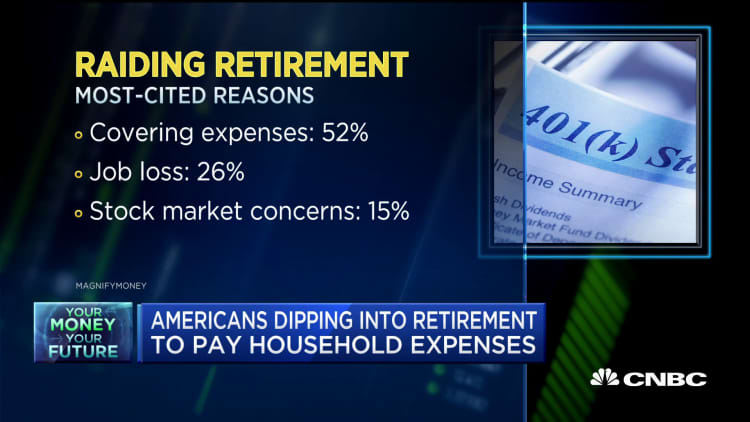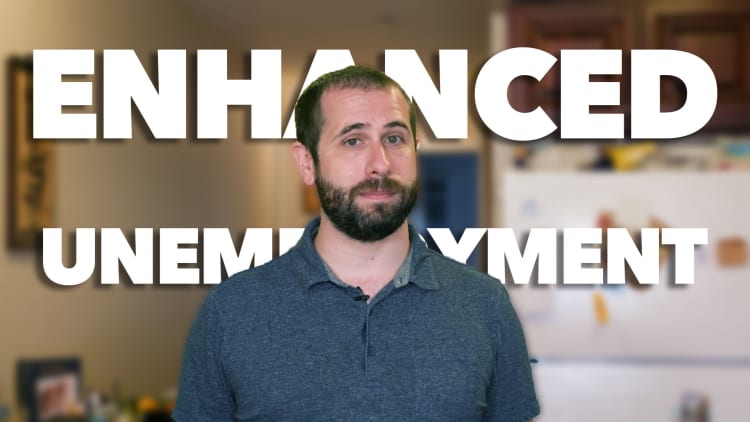If you inherited an IRA, think before you take that tax-favored $100,000 distribution.
That's because the relief the CARES Act offers investors who have individual retirement accounts and 401(k) retirement plans isn't as generous to those who inherit these accounts, according to the American Institute of CPAs.
The CARES Act provides several options for cash-strapped savers who have been affected by the coronavirus pandemic.
First, it allows savers to tap up to $100,000 in coronavirus-related withdrawals from their traditional IRA or 401(k) plan without facing the 10% early withdrawal penalty if they are under age 59½. You also have three years to pay the income taxes.

If you repay the $100,000 within three years, you can reverse the tax.
The CARES Act also allows individuals to skip this year's required minimum distribution from their 401(k) or IRA.
Generally, savers who turn 72 must begin annual required minimum distributions from their retirement accounts and pay taxes on those withdrawals. The recently enacted Secure Act raised the start age to 72 from 70½ as of 2020.
As helpful as these provisions are to savers, the IRS must provide additional guidance on whether the rules apply the same way to people who inherit their retirement accounts, the AICPA said in a letter to the IRS and Treasury Department.
Inherited accounts and RMDs

Owners of traditional IRAs and defined contribution plans (including 401(k) and 403(b) plans) can skip their RMDs this year.
The same goes for owners of Roth 401(k) plans. Roth IRA owners, however, aren't subject to RMDs during their lifetime.
There's an opportunity to undo the RMD within 60 days of having taken the distribution.
More from Smart Tax Planning:
These entrepreneurs are nearly out of PPP funding. What's next
Thinking of being your own boss? What it means for taxes
Why businesses aren't rushing to claim the $130 billion PPP pot
Here's the catch for inherited IRAs: While these beneficiaries can bypass this year's RMD, they don't have the opportunity to undo it if they've already taken the money.
"Treasury and IRS should treat all similarly situated taxpayers the same," the AICPA wrote in its letter to Treasury and the IRS.
Withdrawals from inherited IRAs
Savers who take up to $100,000 in coronavirus-related withdrawals from their IRAs or 401(k)s have up to three years to repay the money and do so without income taxes
This same rule doesn't apply to inherited IRAs, which means these individuals can't roll the money back into the account.
The AICPA is calling on the IRS to allow these account holders to repay the money they've taken if they choose.
"Treasury and IRS should allow taxpayers to repay a coronavirus-related distribution taken from an inherited IRA and allow the repayment within 3 years," the group said. "The taxpayer would not then owe any income tax on the distribution."
Got an inherited IRA?
If you haven't taken your RMD from your inherited IRA, don't take it, said Jeffrey Levine, CPA and director of advanced planning at Buckingham Wealth Partners in Long Island, New York.
"If you did take it and you don't need it, hold onto it and look for more guidance from the IRS," he said.
However, if you absolutely need to tap a pot of money and you're choosing between your own retirement accounts and an inherited IRA, the inherited account might be the better choice.
"People are still struggling, so if you need the dollars, then you want to weigh all of your options," Levine said.





